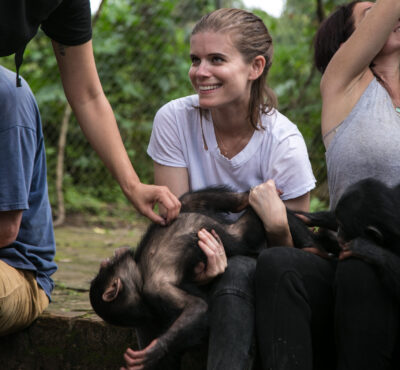
It’s hard to not feel hopeless when reading about climate change and biodiversity loss, particularly as a parent of three young children. I’m nervous for their future and what the planet will look like, with scientists delivering a “final warning” at the United Nations’ Intergovernmental Panel on Climate Change (IPCC) just last month.
This year, the theme of Earth Day is “Invest in Our Planet,” designed to persuade businesses, governments and citizens around the world of the need to invest in our planet to improve our environment and give our descendants a better and safer future. Part of investing in our planet is teaching our kids about the realities of our planet in peril in a way that inspires them to recognize what is good and bad for the earth.
Here are some basic things we can do with our children:
1. Eat plants
Animal agriculture is one of the very top offenders when it comes to climate change. it’s important for kids to know that what (or who) they choose to eat makes a really big impact on the planet. I used to shy away from talking about the realities that animals face in the meat and dairy industries, but it turned out that their natural love for animals served as a segue into the issue and now they are so proud to eat their veggies!
2. Charity involvement
It’s never too early to expose your kids to the fact that there are many people (and animals, too), that could really use some help. A simple internet search will connect you to organizations in your community that may need help with food pantries, meal delivery, clothing swaps, planting trees, animal adoption events, and so much more. Get involved as a family!
3. Reusable water bottles
I think most kids are familiar with reusable water bottles, but do they know why they’re important? Talk to your kids about plastic waste and how they are helping the earth and animals simply by using them.
4. Get in the dirt
There’s no better way encourage respect for the earth than by spending time outside. Educate yourself and explain the magnificence of trees, plants, our oceans, and how our everyday choices impact their very existence.
5. Screen time
There are so many documentaries and shows that really break down the wonders of nature and various species from around the world. Narrators like David Attenborough have taught us just how vital conservation efforts and habitat protection is and how connected we all are.
This year, I’m proud to support WildAid in their mission to reduce global consumption of wildlife products, safeguard vital marine ecosystems, and identify climate change as the critical threat to all life on earth. Their programs are designed to uplift and empower individuals and communities so they can protect their land and native wildlife from poachers and other profit-seekers. Join me and chip in today!
– Kate Mara
Kate Mara is an Emmy-nominated actress from television including House of Cards, A Teacher, and films including The Martian, Megan Leavey, and Chappaquiddick. You can see Kate in the upcoming FX thriller, Class of ’09 premiering on Hulu May 10.
Stay in touch and get the latest WildAid updates.
SIGN UP